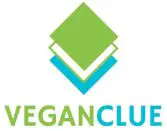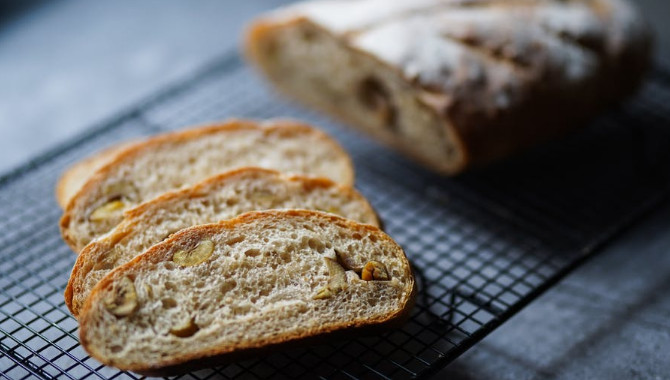Whether you have recently turned vegan, or have been living the lifestyle for years, it is somewhat inevitable that you will encounter certain foods and have no idea whether or not they are suitable. If you are anything like me, you will have looked at foods you are convinced will be vegan, only to see an animal product listed within the ingredients, and you will have encountered other foods that surprise you by being totally vegan-friendly. One food type that causes a lot of confusion among vegans is bread, with sourdough being a variety that many people are unsure about.
So is sourdough bread vegan? Generally speaking, the answer is ‘yes’. In most cases, sourdough bread is made from just three main ingredients: flour, water and salt. Even when additional ingredients are used, these are often vegan-friendly too, so it is certainly true that vegans can eat sourdough bread.
Some of the most common examples of added ingredients that are permitted within a vegan diet include baker’s yeast and a number of vegan-friendly sweeteners. However, this is not necessarily the case across the board. It is, therefore, sensible to check the ingredients list on any sourdough bread that you buy from a shop, as some brands may use animal products. In this article, I will cover some of the main ingredients you need to watch out for when buying sourdough bread, as well as some of the grey areas that exist when dealing with all bread types.
How is Sourdough Bread Made?
On a basic level, sourdough bread is made using a combination of flour, water and salt. A starter is made, with flour and water creating the dough, and this is then fermented using the microorganisms lactobacilli and wild yeast. These microorganisms naturally occur when flour and water are combined, left for sufficient time, and refreshed appropriately. This process then helps to give the bread a more sour taste and the salt is then added to provide flavour. As a result, all of the core ingredients of sourdough bread are perfectly suitable for vegans.
So, to be clear, sourdough bread can be perfectly vegan-friendly, without requiring any alterations to these ingredients. You could make your own vegan sourdough bread at home and its taste and texture would be perfectly in-keeping with the sourdough bread you might buy from a shop, or eat in a restaurant. Similarly, most of the sourdough bread that you find in shops or eat in restaurants will also be vegan-friendly. However, it is still important to check the ingredients.
The main pitfalls occur when the sourdough bread you buy from shops is marketed as being either ‘enriched’ or ‘enhanced’. Put simply, this means that additional ingredients have been added to the mix. While most of these additional ingredients will still be vegan-friendly, there are a few notable exceptions.
In particular, the use of milk in place of water can be reasonably common, while eggs and/or butter may also be added to the mixture. Another common way that sourdough bread can be enriched is through the use of sweeteners. Again, the majority of these will be vegan-friendly, but you will need to watch out for the potential use of honey.
Some varieties of sourdough make use of either whey or casein, as these ingredients can modify the flavour and texture of the bread. However, casein is derived from milk, while whey is generally a byproduct of cheese production, meaning both are off-limits to vegans. Although they are used much less frequently, some of the other non-vegan ingredients you will need to keep an eye out for include buttermilk, cream, ghee, lard and margarine.
When checking the ingredients list, it is possible that the starter will simply be listed as “sourdough starter”, so you may need to look more closely to see if there is a breakdown. If there does not appear to be a list of the starter ingredients, check the allergy information for any reference to milk, butter, eggs or cheese. If you are buying the bread from a local bakery, you might also want to ask whether the bread tin was greased using butter or margarine.
There are some other potential ingredients which represent more of a grey area in terms of whether or not they can be classed as vegan, with some of the main examples being lecithin, monoglycerides and diglycerides. So what are these ingredients, how common are they, and what are the potential issues with their use in sourdough bread production?
Potentially Non-Vegan Ingredients
The issue of whether or not sourdough bread is vegan can potentially become more complicated when certain ingredients are used, including the aforementioned examples of lecithin, monoglycerides and diglycerides. Generally, these ingredients are used as emulsifiers, helping to extend the shelf-life of the bread, improve the texture and provide the bread with more moisture. They are also usually vegan-friendly, but not always.
In the case of lecithin, the ingredient is mainly obtained from soybeans, making it perfectly acceptable as part of a vegan diet. However, you will see the potential problem once I explain that lecithin can also be obtained from egg yolk. For the sake of clarity, this is less common than the soybean method, but there is no immediately obvious way to tell whether or not the lecithin has been ethically sourced. For this reason, the strictest vegans may steer clear.
A similar explanation also applies to both monoglycerides and diglycerides, which are classed as glycerides. When used within food, their main purpose is to prevent the separation of oils and water. Again, they are usually derived from soybeans, or seed oils, but they can also be produced using a range of different animal fats. Some brands do specifically state that their monoglycerides and diglycerides are vegan-friendly, but they are not obligated to do so.
For some vegans, the low likelihood of these ingredients either containing or being produced using animal products is enough to make them acceptable. When you were first deciding on why to become vegan, you may have established some level of acceptable risk and I would not want to challenge you on what you decided. Personally, I choose to stay away from these ingredients, unless the product is specifically certified as vegan-friendly.
It is also worth pointing out that these ingredients are less common in sourdough bread than some other bread types.
Other Vegan-Friendly Bread Types
Most other bread types follow very similar principles, in that they are usually vegan-friendly, but there are some ingredients you need to watch out for. The basic rule is that most bread can be vegan, but you should not automatically assume that all bread sold in shops or served in restaurants actually is vegan. The main offenders are the use of milk instead of water, the use of eggs to help bind or flavour the bread, and the use of butter, buttermilk, casein or whey.
The exact same potential dilemma with lecithin, monoglycerides and diglycerides will apply to other forms of bread and this will require you to make a judgement call. This will likely depend on the factors that influenced your decision on why to become vegan and the availability of information on where these ingredients were sourced.
Certain types of bread are obviously off-limits in all instances, with honey wheat being one example of this. Some bread types also make use of cheese and this may be added to the bread afterwards, or baked into it.
There are also some bread varieties that are sometimes suitable for vegans, but usually problematic. These include Indian-style naan breads, which will often contain milk or ghee, and brioche buns, which will typically include either eggs, butter, or both. You should never assume these bread types are vegan, but they can be made vegan by replacing these problematic ingredients with widely available alternatives, such as vegan butter and egg replacer.
Aside from sourdough, some of the bread types that are usually vegan include: pita bread, ciabatta and bagels. Most sandwich bread, including loaves and rolls, will be vegan, but it is important to double check. You should also take care with crumpets and pikelets, as they can be vegan, yet some of the major brands use milk, butter or buttermilk.
Tips For Buying Vegan Sourdough
I have hopefully established that sourdough and many other types of bread are usually vegan-friendly, but it is still important that you exercise caution when buying sourdough bread from supermarkets, restaurants, bakeries and other places. For this reason, I have compiled a basic checklist to work through.
For bread being bought from a supermarket or shop, the first step is to check the ingredients list. In particular, look out for any reference to milk, eggs, butter, buttermilk, honey, cheese, ghee, lard, whey and casein. You will need to make your own decision if lecithin, monoglycerides or diglycerides are listed. Wherever possible, try to stick to sourdough bread that is marketed as vegan-friendly. A good rule of thumb is that the fewer ingredients that are listed, the less processed the bread is – and the less processed the bread is, the more likely it is to be suitable for vegans.
When buying from a restaurant, it is always a good idea to make clear that you are a vegan, as this can allow the restaurant to take additional steps to avoid accidental cross-contamination with animal products. Look for a reference to whether or not the bread is vegan-friendly on the menu and if no indication is given, ask your waiter or waitress. Most sourdough will be suitable, but if you are left in any doubt, it is probably best to avoid it.
If you are buying the sourdough bread from a bakery and the ingredients list is not available, ask someone who works there whether or not it is vegan-friendly. For safety, you should also ask whether or not the bread tin or other cooking equipment was greased using butter or margarine, as this would make the bread unsuitable.
Finally, for homemade sourdough, remember that even non-vegan recipes can be made vegan by replacing milk, eggs, butter and similar ingredients with vegan-friendly alternatives, such as egg replacer and non-dairy milk.
Welcome to VeganClue - My name is Robert Van De Ville and together with my team we spent hundreds of hours researching the most relevant topics for Vegans and non yet Vegans. Are you looking for more information about Veganism, animal welfare, diet, health, and environmental benefits of the Vegan lifestyle? You are in the right place! Enjoy the site.

